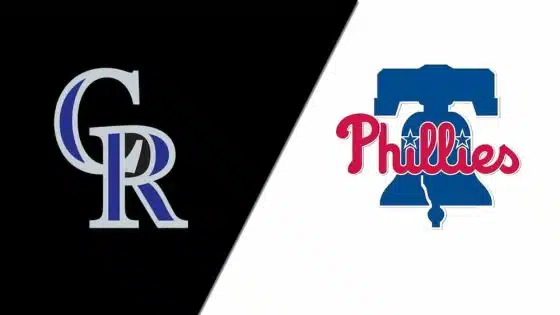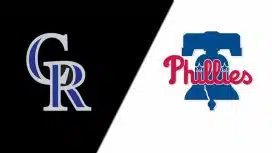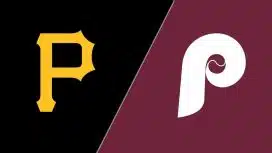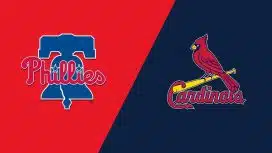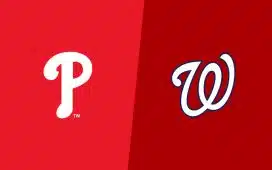By Tim Kelly, Sports Talk Philly editor
It sounds like a great pitch for a Hollywood (pun very much intended) movie: a prospect comes up with a team, wins a World Series MVP with them, gets traded during some lean years, only to return and help the team that drafted him win a second World Series title.
But would this pitch just lead to a good trailer, or a cinematic sequel worth seeing?
Cole Hamels, Philadelphia Phillies franchise icon and current Texas Ranger, is who is being alluded to here, of course. On July 31st, 2015 – less than a week after he threw a no-hitter – the Phillies traded their former first-round pick to the Rangers. The Phillies, who would post a league-worst 63-99 record in 2015, received six players in the deal, including prospects Nick Williams, Jorge Alfaro, Jake Thompson and Jerad Eickhoff, who they hoped would help kickstart their rebuild.
It's still largely unclear how impactful that return will be for the Phillies, but it isn't unclear that their rebuild has been successful – it's the middle of May 2018 and the Phillies have one of the best records in the National League. While Hamels did reach the postseason with the Rangers in 2015 and 2016, the Rangers are already in a deep hole in the American League West, one of the best divisions in the sport. It appears they are headed for at least a retool.
So naturally, there's been increasingly-hard-to-ignore speculation that Hamels could have a storybook ending to his career in Philadelphia. The 34-year-old didn't diffuse the situation last May when he told Matt Gelb, writing for The Philadelphia Inquirer, that he wouldn't close the door on a potential return to Philadelphia. Speculation has again reached a fever pitch, with Jon Heyman of FRS Baseball predicting this past week that the Phillies are the "best bet" to land Hamels if the Rangers do move him before the July 31 non-waiver trade deadline. MLB.com's Jon Morosi also reported in April that the Phillies aren't one of the teams that Hamels can block a trade to in 2018 as part of his partial no-trade clause, which would make facilitating a trade easier.
But if it feels like the stars are aligning, that's probably a stretch.
First of all, if the Phillies make a noteworthy trade this summer, there's no reason to think it will be for a starting pitcher. Aaron Nola has a 1.99 ERA through his first nine starts, while Jake Arrieta has been a very effective addition to the rotation thus far. Meanwhile, the duo of Nick Pivetta and Zach Eflin have been more impressive at the major league level in 2018 than they ever have previously. Vince Velasquez, despite a 5.05 ERA, has had starts this year that suggest he's close to putting things together, and his advanced metrics (like his 3.85 xFIP) suggest he's due for some positive regression. The aforementioned Eickhoff, who many thought would be the team's No. 3 starter before he suffered a back injury, may be the odd-man-out of the rotation when he does return. The Phillies aren't lacking in rotation options currently.
The feeling here is that if the Phillies are still in the playoff hunt after the All-Star Break, they would be unlikely to make a major addition to the starting rotation. Things can change, but general manager Matt Klentak may choose to ride out the 2018 season with the team's current crop of starters. Remember, even beyond the current depth, top prospects Sixto Sanchez, Adonis Medina, JoJo Romero, Franklyn Kilome, Ranger Suarez and Enyel De Los Santos could all debut at some point in 2019. The Phillies could soon be swimming with pitching depth, but it may make more sense for them to allow things to play out and potentially make a major trade next summer, when they'll have a better understanding of what each of their arms is at the major league level and their offense is more mature.
Even if the Phillies do make a major trade for a starting pitcher this summer, it's unclear how good of a fit Hamels would be.
Hamels is currently in the final year of a six-year/$144 million deal that he signed with the Phillies in July of 2012. An oblique strain limited him to just 148.0 innings in 2017, essentially ending any chance that he pitches 400 or more innings between 2017 and 2018, which would cause his $20 million option for 2019 to vest.
Trending: If There Ever Was A Legitimate Debate About Odubel Herrera, It's Over
The Rangers could still choose to exercise his $20 million option for 2019, but it's difficult to imagine a rebuilding team choosing to do that. That, among other reasons, is why many think the Rangers could look to move Hamels this summer. But as Heyman alluded to in his piece, there isn't going to be a giant market of teams that are eager to take on his salary and still part with a trade return for him. Teams will be even less eager when they know that it's possible that Hamels will be a free-agent this offseason if his 2019 option is declined.
Hamels, who will turn 35 in December, is 2-4 with a 3.48 ERA, 4.83 FIP and 4.13 xFIP. This comes after he posted a 4.20 ERA and 4.62 FIP in 148.0 innings in 2017, a season in which an oblique injury cost him two months. He still posted a 1.5 fWAR in 2017, though it was a noticeable step back considering he averaged a 4.2 fWAR between 2007 and 2016. He's posted a 0.3 fWAR through his first nine starts of 2018. His production dating back to 2016 suggests that while he's still an effective major league pitcher, he's no longer the front-of-the-line starter that made four All-Star teams.
Not that every team couldn't always use middle-to-back of the rotation depth, but Hamels is an expensive option at this stage of his career. The Phillies likely can find a better use for the $20 million they would have to pay him if they traded for him and exercised his 2019 option. Even if he becomes a free-agent at the conclusion of the 2018 season, it just doesn't seem that likely that the Phillies will compete for him on the open-market, even if both sides are fond of each other.
When the Phillies traded Hamels to the Rangers in 2015 (and even for a few years prior to that), their timeline no longer matched up with his. They were a team in need of a rebuild, while he was in the midst of the back-half of his prime. Ironically, as this era's Phillies begin to see their window open, Hamels' time as a front-line starter for a contending team appears to have slammed shut, even if he's still an effective pitcher.

